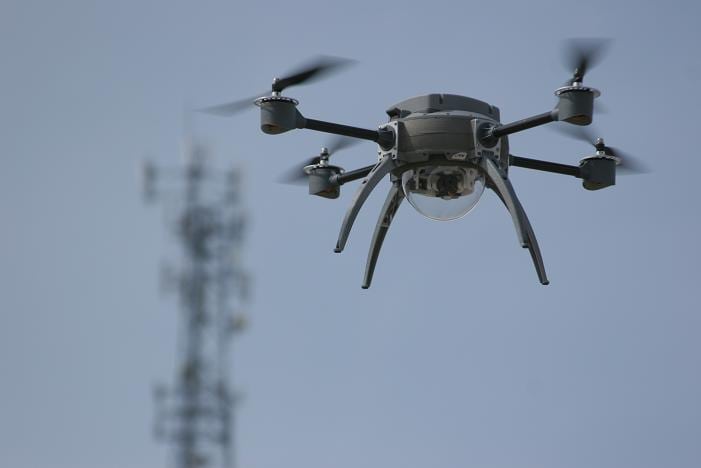
The Federal Aviation Administration (FAA) has a new permanent unmanned aircraft systems (UAS) integration initiative called BEYOND. (FAA)
The Federal Aviation Administration (FAA) has a new permanent commercial unmanned aircraft systems (UAS) airspace integration initiative, BEYOND, that will focus on three challenge areas: beyond visual line of sight (BVLOS) operations, leveraging industry, and focusing on community engagement, according to an Oct. 30 press release.
BEYOND will replace the UAS Integration Pilot Program (IPP) which ended on Oct. 25. The BEYOND program will work with eight of the state, local, and tribal governments that participated in the IPP, according to the release.
“The IPP propelled the American drone industry forward, allowing for unprecedented expansions in testing and operations through innovative private-public partnerships across the country,” U.S. Chief Technology Officer Michael Kratsios said in a press statement. “Now, the BEYOND program will build upon this success, tackling the next big challenges facing drone integration.”
The BEYOND program’s BVLOS operations will focus on infrastructure inspection, public operations, and small package delivery, according to the release. The FAA will look to use industry operations to analyze and quantify the societal and economic benefits of UAS while taking into account community concerns by collecting and analyzing community engagement.
“We will build on our relationships with the partners from the pilot to continue to collaborate on challenges that we identify and support innovation in the industry,” the FAA told Avionics International. “This includes tackling safe, repeatable, scalable, and economically-viable UAS flights beyond the pilot’s visual line of sight as well as better understanding the societal and economic benefits of UAS and developing best practices for community engagement.”
Eight IPP participants were selected to participate in BEYOND including Choctaw Nation of Oklahoma, Innovation and Entrepreneurship Investment Authority of Virginia, Kansas Department of Transportation, Memphis-Shelby County Airport Authority, North Carolina Department of Transportation, North Dakota Department of Transportation, City of Reno, Nevada, and the University of Alaska-Fairbanks.
Following the lead of the IPP, the FAA will use BEYOND to support its COVID-19 response.
“The FAA is proactively taking steps to help address the widespread economic and health effects that the COVID-19 pandemic is having on the aviation industry,” the FAA said. “Specific to the IPP, at the onset of the pandemic, many of the participants were able to pivot from their original missions to support the COVID-19 response and recovery, demonstrating the increasing value of drone operations in this new environment.”
The FAA said the BEYOND program will work under established rules rather than issuing periodic operational waivers.
“Approving operations through waivers enabled us to gain valuable knowledge and data as operators built their safety cases and flew thousands of missions,” the FAA said. “To scale this to the type and number of UAS operations we expect in the future though, we need to craft rules, policy, and guidance that would enable future safe, routine operations without the need for the labor-intensive waiver requirements. That could include all of the provisions that currently require a waiver under Part 107.”
Moving forward the FAA will review proposed concepts of operations that were submitted by the eight lead participants in the BEYOND program. Once those plans are finalized, testing will begin with BVLOS strategies.
The FAA confirmed to Avionics that it is still on track to release a UAS remote ID ruling next month which will be crucial to integrating unmanned aircraft for commercial and civilian operations into the national airspace.